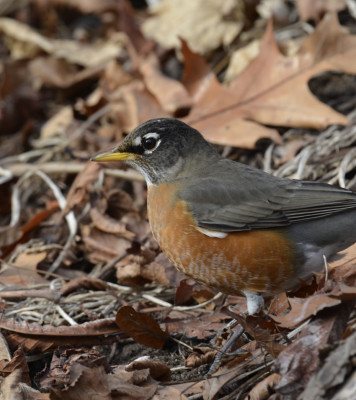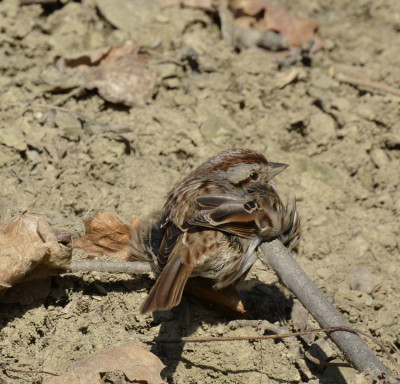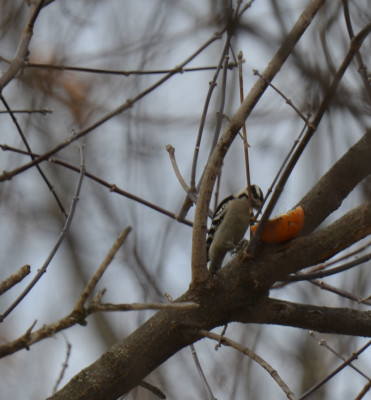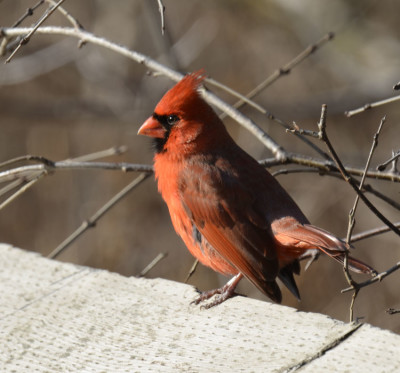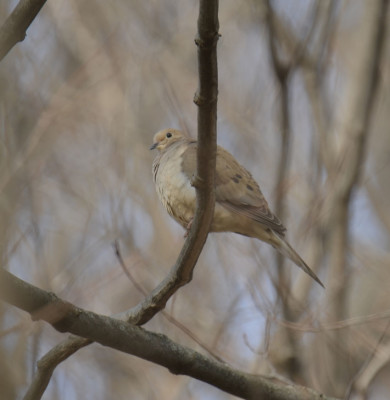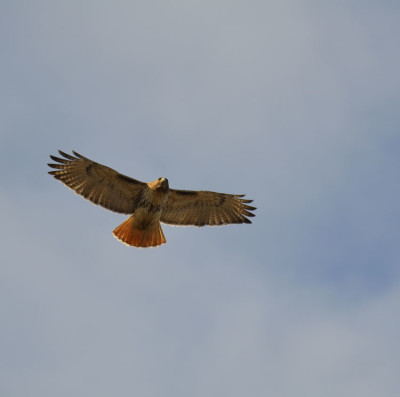We’ve had way too many heavily overcast, rainy, misty, sleety, and even snowy days in the past few weeks. So when one day the sun burst through and the temperature spiked up to over 4 C, I set off for a lovely ramble around Riverwood.
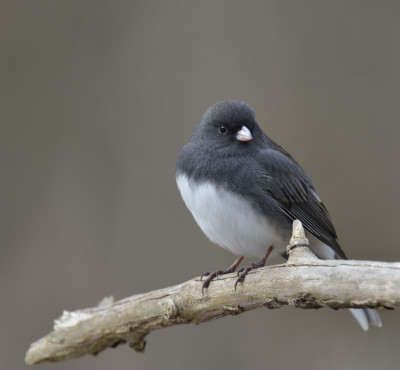
Everyone including this Dark-eyed Junco seemed to be enjoying the warm weather.
Robin of Riverwood
Walking down the steep hill from the main parking area, I paused to watch a large gathering of robins. They were flicking leaves aside with bills and feet and looking eagerly for food underneath. They must have been finding something because they continued their hunting for more than the 10 minutes that I watched. Possibly the robins found insects attracted to the warm, decomposing leaves, or perhaps they found transforming larvae and hibernating moths. Anything would probably make a welcome change from dry, scratchy sumac berries and wizened, half-rotten crabapples.
A Brave Bird Bathes In Winter Cleverly
Further on, there is a hillside that has eroded badly exposing a dry, sandy soil. The sun was heating the sheltered area nicely and a Song Sparrow was enjoying the opportunity to bathe. It wasn’t down in the muddy, icy, shallow puddles below that dotted the creek bed. It was taking a dust bath, shivering out its feathers and brushing them against the ground, then sitting back up to preen.
Why Is That Orange In That Tree?
Another thing that caught my eye was a bright orange hemisphere about 15 feet off the ground in a young very branch-y tree. I noticed it because a Downy Woodpecker was picking at it. A close-up view showed it was half an orange—but how did it end up in that odd location in the tree? It couldn’t be easily placed there by a person, although I know people do put out oranges for birds in winter.
One of my children came up with the most logical explanation: a squirrel probably carried it off and either left it there for later or dropped it and it wedged there as it fell down from a larger tree above. Either way, the female Downy was happily pecking at it.
Other Winter Birds to Admire
Along my ramble, I saw a few other colourful birds. Several American Goldfinches were feeding off the seeds of grasses and flowers. Some were perching on the ground and jumping up only long enough to pluck a seed before settling down again to eat it.
Cardinals were not singing but they were checking out the various feeders along the trail.
A male Red-bellied Woodpecker was also making himself heard. He called frequently in between hunts along branches and on dead Ash trees for prey. There were either two males during my walk, or the same bird caught up with me when I stopped to feed the Chickadees.
A flock of over 20 Mourning Doves all lifted off the ground and into the trees when a dog bounced up the trail towards them.
And each time I stopped a mob of chickadees would soon gather around me, landing on the twigs by my shoulders and even trying to perch unsuccessfully on the end of my camera lens. It’s actually rather funny to hear their claws scrabbling for a grip on the smooth plastic as they slide off, even if it’s a bit annoying if they’ve made me lose focus on my subject.
The only time the Chickadees calmed and quieted was when a pair of Red-tailed Hawks started gliding in medium-small circles overhead. They spun around lazily for several minutes, never leaving each other but never catching up with each other, either. They ignored all the fat squirrels nearby and did not make their usual hunting runs out over the feeders. I think this may have been part of their spring pair-bonding although it wasn’t one of the fancy acrobatic flights you read about with courting hawks.
Overall, it was a marvelous afternoon to be out enjoying the sunshine with countless like-minded birds.
Related Reading
- Juncos Think Toronto Is a Great Spot for a Winter Vacation
- Robins Can Over-winter in Southern Ontario
- American Tree Sparrows Have a Two-Coloured Bill
- The Sparrow Most Likely to be Confused with Something More Interesting
Join In
Did you take a recent winter ramble? Please share your sightings with a comment.

